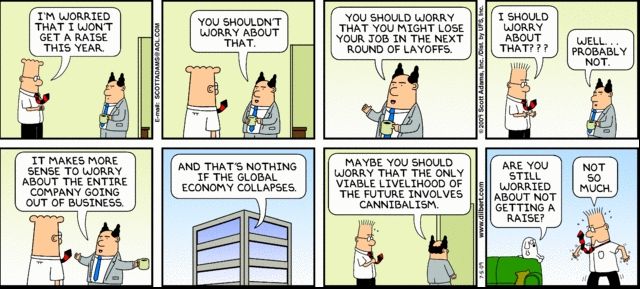Microsoft, Yahoo! and Google Giants in combat거인들의 전쟁
Feb 7th 2008
From The Economist print edition
Microsoft should be allowed to buy Yahoo!—and Google should be free to fight back 마이크로소프트가 야후를 살수 있도록 해야한다 - 그리고 구글은 그에 대한 반격을 준비해야 할것이다.
|
|
 |
|
|
THIS was the week that seemed to confirm the new balance of power in the technology industry. Computing is moving online, away from the desktop—and away from Microsoft, the desktop-software leviathan, to Google, master of online search. Microsoft's determination not to lose the struggle became clear when it bid $44.6 billion in cash and shares for Yahoo!, an ailing internet giant (see article). If the deal goes ahead, it will reshape the technology industry and clear the way for a straight fight between Microsoft and Google for dominance in the internet era. But whether Microsoft's bid succeeds or fails, it changes how all three firms are perceived.
금주는 기술산업에서 새로운 힘의 균형을 확인할수 있는 한주였다.컴퓨터는 데스크탑을 떠나서 온라인으로 이동하고 있다. - 그리고 소프트웨어 거인인 마이크로소프트의 데스크탑을 떠나서 온라인 검색의 마스터인 구글에게 말이다. 마이크로소프트의 전투에 지지 않겠다는 결정은 그들이 야후의 주식을 446억원에 현금과 증권 교환으로 병든 인터넷 거인인 야후를 인수하겠다는 상황에서 여실히 보여주었다. 만약 거래가 성사된다면 기술산업 전반의 모습의 변화와 인터넷에서의 우위를 점하기위해 구글과 마이크로소프트의 결전이 예상된다. 하지만 성사 여부와는 관계없이 세개의 회사를 어떻게든 눈에 띄게 바꾸어 놓을것이다.
Yahoo!'s status as the also-ran that seemed poised to inherit the internet, but failed to keep up with the changing technological times, is cemented. Microsoft, which has never made an acquisition on anything like this scale, has in effect conceded that it cannot compete with Google on its own; its bid highlights its own weakness almost as much as Yahoo!'s. Meanwhile, Google's objections to the proposed deal on antitrust grounds—even though the combination of Microsoft and Yahoo! would still trail far behind it in both internet search and advertising—show that the firm has failed to grasp that it, not Microsoft, is now regarded as the industry's Goliath.
Microsoft is the larger company by market capitalisation, of course, being worth some $270 billion, compared with Google's $160 billion or so. But the software market in which Microsoft mainly operates offers far weaker growth prospects than the intertwined search-and-advertising market dominated by Google. The search giant's pre-eminence in these fields is not related to a proprietary technological lock-in (internet users can easily switch between search engines); its market share falls far short of the 90% that Microsoft boasts in desktop operating-systems and office-productivity software; and it is not a convicted monopolist. So to call Google the new Microsoft is, in many ways, unfair. But it is undeniably the company that other technology firms and media giants are now most scared of—including Microsoft itself. Google's growing market share in search, and hence its clout in online advertising, make it look unstoppable.
What particularly worries Microsoft is the prospect that software will increasingly be delivered as an internet-based service, supported by advertising. Google already offers a few such services, and is venturing onto Microsoft's patch. Microsoft's counter-attack has failed to make headway. Despite repeated relaunches, its search engine has a worldwide market share of 2.9%, against Google's 62.4%. Microsoft's share of online advertising is equally puny. Hence its bid for Yahoo!, the number two in search and advertising.
The two talked about a merger or partnership in 2006 and 2007, but at the time Yahoo! still hoped that Panama, a new system for placing advertisements next to the results of internet searches, would enable it to catch Google. Panama has failed to live up to expectations, however, and Yahoo!'s latest results caused its share price to fall to a four-year low on January 30th. Microsoft duly pounced. Unless a rival bid emerges, which is unlikely, or Yahoo! tries to save itself from the beast of Redmond by outsourcing its search-and-advertising operations to Google, Microsoft seems likely to get its prize.
Just how anti-competitive would a Microsoft-Yahoo! merger be? It is true that the combined firm would dominate the markets for instant messaging and web-based e-mail, but neither is lucrative. In the markets that really matter—search and advertising—the Microsoft-Yahoo! combination would still trail far behind Google, which is hoping to extend its reach in advertising even further by buying DoubleClick. The danger remains that Microsoft will somehow exploit its desktop monopoly to push Google aside. But how, exactly? Microsoft is being closely monitored by regulators, and if there were any way for it to use its desktop monopoly against Google it would surely have done so by now. Buying Yahoo! does not help it in that respect—and the deal may well backfire anyway. Microsoft has never done a merger of this size, and the two companies have very different cultures: there could be an exodus of engineers to other firms, including Google.
From a regulator's point of view, there are two decisions to make. The immediate one—whether to let a Microsoft-Yahoo! tie-up go ahead—is simple enough: creating a more convincing counterweight to Google can only be good for competition. (By contrast, a tie-up between Google and Yahoo! would constitute a worrying concentration of power.) If Microsoft tries any of its old tricks, it should be punished. As for the longer-term question—what to do about Google?—the answer is essentially the same. Like Microsoft, Google has enormous power in its market, so regulatory vigilance is necessary. But so far nobody, despite much grumbling, has shown that Google is abusing that power. So leave Google alone too, and prepare for an epic battle between the two tech titans.










